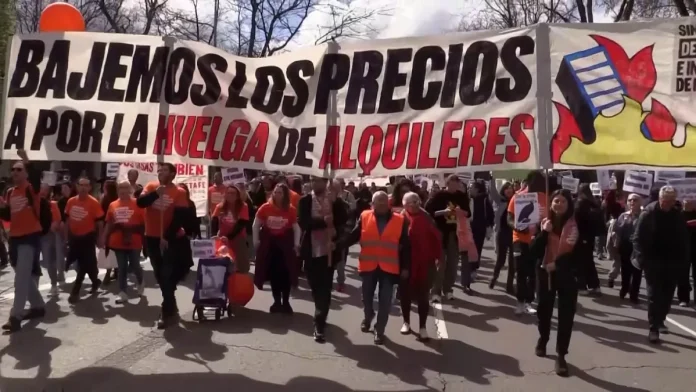On Saturday, 5 April, hundreds of thousands of people marched in over 40 Spanish cities to protest against rising rents and a shortage of affordable housing. Despite Spain’s position as one of Europe’s fastest-growing economies, its housing shortage continues to worsen, fuelled by a booming tourism industry.
Balancing tourism and migration with affordable living has proven difficult for Spain’s centre-left government. In many cities and coastal areas, short-term holiday rentals have replaced long-term housing options, pushing residents out.
In Madrid, over 150,000 protesters took to the streets, according to the city’s tenants’ union. Demonstrators shook keychains and demanded better housing protections, saying the issue affects everyone, regardless of political leadership.
Rents rising as housing options shrink
Rental prices in Spain have doubled in the past decade. House prices have also jumped by 44 per cent, according to property site Idealista. Wages haven’t kept up, and the number of available rentals has dropped by half since the COVID-19 pandemic.
Margarita Aizpuru, 65, lives in Madrid’s Lavapiés district. She said her building’s owners have refused to renew the rental contracts of nearly 100 families. “They’re turning the flats into tourist lets,” she said.
Experts and homeowners’ associations argue that current laws discourage long-term renting. Many landlords now prefer short-term tenants, as it’s more profitable and involves less risk.
Tourism boom fuels demand for space
Spain welcomed a record 94 million tourists in 2024, making it the world’s second most-visited country. The country also saw a rise in migration. Together, these trends have worsened the housing gap, which now stands at around 500,000 homes, according to the Bank of Spain.
Only about 120,000 new homes are built each year. That’s just a sixth of the number built before the 2008 financial crisis. Construction has not kept pace with demand.
Wendy Davila, 26, said high rents are no longer just a city-centre problem. “It’s the same everywhere. You can’t live in Madrid without sharing a flat with four other people,” she said.
